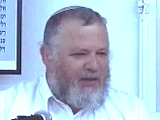46
Simchat Torah, hundreds of Yeshiva students dancing with Sifrei Torah (Torah scrolls). I don't remember why, but I was feeling a little down and wasn't dancing. And from across the big study hall, in the midst of hundreds of students, Reb Avrom, the elderly Rosh Yeshiva, the Rav of thousands of students, noticed one young student who wasn't dancing, his face perhaps betraying some sadness. Reb Avrom crossed the study hall and I was still unaware-the thought hadn't even crossed my mind-that he was doing so on account of me. He approached me with an illuminating countenance, asked how I am, and inquired, why am I not dancing? It is a mitzvah to always be happy, and certainly today! He didn't suffice with that; he took my hand like a good father, led me into the circle of dancers and danced with me, still gripping my hand. I don't remember why I was a bit sad before that, but I do remember that from that moment onwards, I was filled with tremendous simcha (rejoicing). I didn't understand then, and even more so I don't understand today, how did he see? How did he notice that out of the hundreds of students circling and dancing, that there is one young student in a far-off corner of the study hall, not dancing? And when he noticed, he didn't send someone else to call him, but went himself to raise his spirits. This is not just the greatness of a Torah intellect; this is the greatness of a Torah personality.
Years have passed, and in order that my students should taste something of that same atmosphere, something of that special personality, we adopted a practice every year, between Rosh Hashana and Yom Kippur, of taking the 12th-graders to Reb Avrom. Reb Avrom, who was already in his nineties, gave his full attention to the young students, answered their questions, and emphasized again and again, each end every year, the same thing he used to say to us when we were students: "Not to be beinoni (mediocre)!" He would say this with special emphasis, stressing the first syllable of the word beinoni and in a special intonation, "the main thing is not to be BEIN oni!" And also, "the world is waiting for you; the angels of the Torah are waiting for you." With his beaming countenance, humor and stories we would part from him. And each student remained accompanied by Reb Avrom's guidance as well as a sense of happiness, and the internal resolution, each one according to his level, to work harder and to make a greater effort this New Year to strive higher in serving G-d, in character refinement and in learning.
May his merit protect us.










